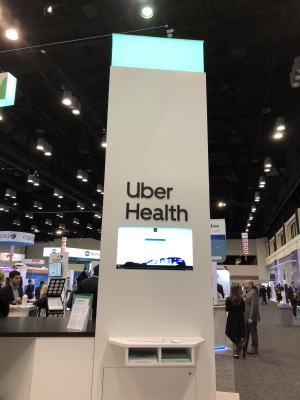Uber and Lyft showcase rideshare for healthcare at HIMSS19
by
Lisa Chamoff, Contributing Reporter | February 18, 2019

Rideshare platforms such as Uber and Lyft are not looking to replace ambulances, but they are marketing new healthcare verticals as a way to remove lack of transportation as a barrier to care for patients.
The two Silicon Valley companies had booths on the massive show floor at HIMSS 2019 in Orlando.
During the show, Uber announced that it is partnering with Ambulnz, a HIPAA-compliant on-demand ambulance service, to help healthcare providers secure non-emergency medical transportation for patients directly through the EHR workflow.
As part of the partnership, the Uber Health Application Programming Interface (API) will be integrated into the Ambulnz platform. Ambulnz, which currently operates in Colorado, New York, California and Tennessee, as well as the U.K., will make Uber rides available through one portal, which Uber representatives say will save time and money while maximizing transparency.
Lyft announced a similar partnership with health IT company Allscripts at HIMSS18.
Transportation has long been a barrier to care for many patients, said Dan Trigub, head of business development for Uber Health, who joined the company late last year after working for Lyft’s healthcare division, and shared his experience as a caregiver for his grandmother, who didn’t have a driver’s license, with HCB News during an interview at the show.
“Especially for low-income, at-risk elderly populations, transportation is critical,” Trigub told HCB News. “Uber does 15 million rides a day. … Being able to leverage that reach in scale using our platform can have a tremendous impact.”
Uber has built a HIPAA-compliant web portal that can be used by a health system or senior living community to order a ride for their patients or residents. The system lets them know when the patient has been dropped off, providing “data and accountability,” according to Trigub. Costs are, on average, 30 to 40 percent lower than taxi voucher programs – not to mention avoiding the cost of missed appointments.
“Many hospitals are paying millions a year on taxi voucher programs with no accountability,” Trigub said. “We think we are the best solution for curb-to-curb transportation, especially compared to a taxi voucher program. We’re way more cost effective, we have full transparency. We see higher [satisfaction] scores with patients that have access to ride-share.”
Uber’s API allows other partners, like Ambulnz, to allow transportation management to be embedded within a clinician’s workflow. HIPAA compliance means no confidential patient information is shared outside the EHR.
“Imagine I’m in an EHR … I have my patient here next to me,” Trigub said. “With the click of a button I can have an Uber available to me now or on a future date. We’re looking at how we provide deeper integration within workflows that exist today. Instead of the case manager having to go to another screen to order a ride, how do we really embed it?”
Both Uber and Lyft tout the fact that access to transportation helps decrease missed appointments.
Both companies have programs that provide service to patients with more specialized needs. For example, Uber Assist allows patients to connect with drivers who are specially trained to provide additional assistance, and Uber WAV provides connections to drivers with a wheelchair accessible vehicle, while Lyft’s app has a special Access Mode designed to allow passengers to find vehicles that can accommodate wheelchairs.
|
|
|
You Must Be Logged In To Post A Comment
|
